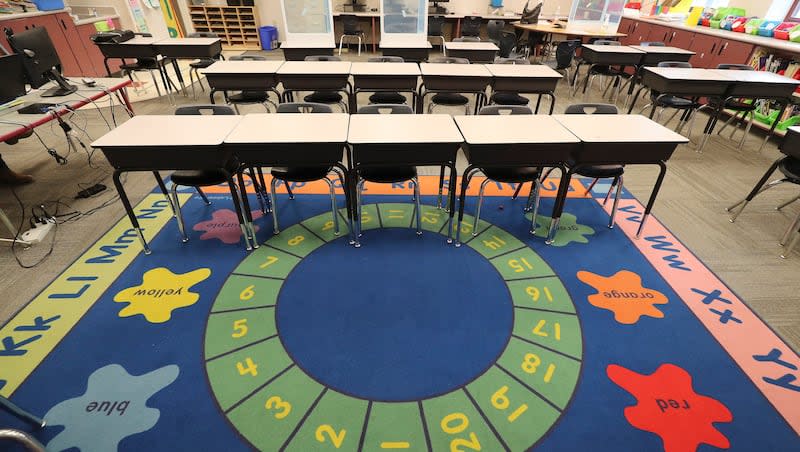UEA opposes removing constitutional earmark on income tax for education

The Utah Education Association has announced its opposition to a proposed amendment to the Utah Constitution that would open the state income tax fund to “other state needs.” It is currently earmarked for public and higher education and programs for children and individuals with disabilities.
In a statement issued late Thursday afternoon, UEA President Renée Pinkney said the union’s board of directors voted unanimously to oppose the constitutional amendment, which will be on the statewide ballot in November.
“This decision was not taken lightly. The UEA Board of Directors believes the proposed amendment goes against our values and challenges what we stand for,” Pinkney wrote in a letter to UEA members.
It continued, “We have yet to realize a fully funded public education system in Utah. The UEA has been protecting the promise of public education for over 150 years, and we don’t intend to compromise our values now.”
UEA, the state’s largest teachers’ association, took issue with the Utah Legislature’s appropriations to the Utah Fits All Scholarship program, which will provide $8,000 scholarships to 10,000 qualifying Utah students for private school tuition, other private education programs or services starting this fall.
“Alarmingly, during the past two legislative sessions, the Legislature appropriated $82 million to the newly established — but not yet started — private school voucher program. Imagine what this funding could do to meet the ever-increasing needs of our public school students and educators,” Pinkney’s letter states.
Income tax has been reserved for funding public education since the mid-1940s, although the state constitution has been twice amended over the years to also allow using income tax revenue to support public colleges and universities and, more recently, for programs for children and people with disabilities.
Legislative leaders say the structural imbalance in state tax revenues ties their hands in budgeting decisions at a time when income tax revenues are outstripping sales tax revenue.
Utah Senate President J. Stuart Adams, R-Layton, said “UEA’s opposition is disappointing given the Legislature’s relentless dedication to prioritizing education.
“Our track record speaks volumes about our commitment to education, which is evident in increasing education funding by 94% over the past 10 years. This proposed constitutional amendment offers a dual advantage: it guarantees new protections for education funding in a way that allows greater flexibility in addressing the pressing needs of the state while simultaneously eliminating the burden of sales tax on food.”
Adams said he requested feedback from UEA during the just-concluded legislative session.
“UEA chose not to engage and waited until after the session to change their official position. Stakeholders coming to the table to offer solutions is more productive and effective,” he said.
A majority of Utah voters would need to approve a constitutional amendment for it to take effect. If voters approve the constitutional amendment, state lawmakers will repeal the state portion of food tax starting in 2025, although the local portion of the food tax will remain.
“It is a tough choice between paying food tax because everybody has to eat. It is a regressive tax. However, a fully funded public education system has never been realized in Utah. Our kids deserve to have a highly qualified educator in a well-resourced classroom that’s welcoming, that fosters belonging on Day 1. Our kids need to have smaller class sizes. They need to have one-on-one support when they are struggling with a particular subject or topic. We can’t do that if we are not fully funded,” she said in an interview.
Sen. Dan McCay, R-Riverton, and Rep. Karen Peterson, R-Clinton, sponsors of SJR10, which placed the proposed amendment on the 2024 ballot, issued a statement late Thursday, calling the resolution “good for education and good for Utah families.”
The statement, in its entirety, said: “Education funding is a top priority for the Utah Legislature and our constituents. We appreciate our educators, and have nearly doubled public education funding in the past 10 years. The education budget is $8.43 billion with a $832 million increase this year alone.
“SJR10 prioritizes education funding in our state constitution cementing our commitment to education by ensuring students and educators have necessary resources while providing voters the opportunity to remove the state sales tax on food. SJR10 is good for education and good for Utah families.”
House Minority Leader Angela Romero, D-Salt Lake City, issued a statement in support of UEA’s position:
“If SJR10 is implemented, it would authorize the Legislature to redirect funds away from public schools. As an elected official, one of my top priorities is to ensure that all children have access to high-quality education. I support UEA’s decision to oppose SJR10, because this proposed amendment to the Utah Constitution contradicts the crucial need to invest in our public education system.
“I urge Utah voters to familiarize themselves with the items on the November ballot and make informed decisions about their votes. By voting against the proposed constitutional change, you will be protecting Utah’s public school system and ensuring that every child has the opportunity to receive a quality education.”

